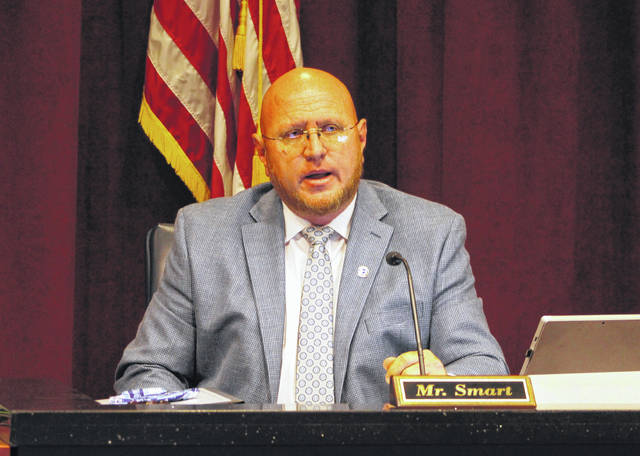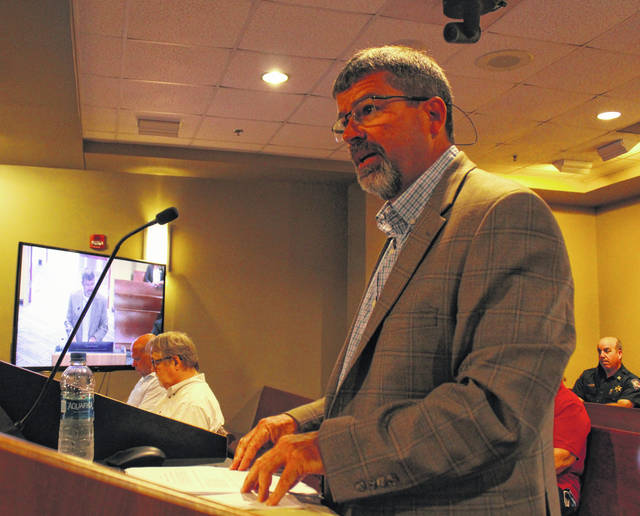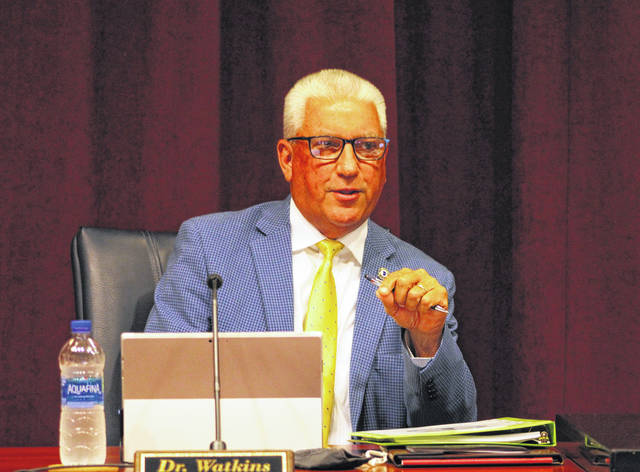
Gavin Stone | Daily Journal
Board of Commissioners Chairman Jeff Smart speaks at the board’s meeting on Tuesday.
No tax rate increase, no fund balance used
CORRECTION: This story has been updated to reflect that Justin Dawkins voted against the county’s fiscal year 2021-2022 budget.
ROCKINGHAM — The Richmond County Board of Commissioners on Tuesday approved their budget for fiscal year 2021-22 with funds set aside for salary increases for county staff, including the Sheriff’s Office, and continued the county’s efforts since 2018 to end several bad financial habits — all while avoiding a tax rate increase, which county leadership has said would hinder industrial recruitment efforts.
Vice Chairman Justin Dawkins, a Republican, voted against the budget, making for a 6-1 tally. Dawkins said in a text Wednesday that the budget “failed to address both the immediate and future needs of Richmond County, and in so doing made it impossible for me to support.”
The current trajectory of the county’s budget began with a series of letters from the Local Government Commission (LGC) in 2018 warning the county that its available fund balance had drifted dangerously low to the minimum of 8.33% of general fund expenditures, reaching as low as 11.82%, which significantly lower than the 32.23% average for counties of Richmond’s size as of spring 2019, according to the LGC. The fund balance had been depleted due to its decades long role as a means of balancing the budget.
In addition to using fund balance to make up its budget shortfalls, the county had also relied on appropriations of funds from the solid waste fund to balance the budget beginning in 2013. The solid waste fund is meant to be self-sustaining through fees only, meaning all of its revenue being used to provide the solid waste services.
Now, after taking a series of dramatic steps over the last three years, the county has avoided a solid waste fund transfer for the first time since fiscal year 2011-2012, and for the third year in a row has avoided a fund balance transfer. Those steps included a $0.04 tax increase to the current level of $0.83 per $100 in valuation for 2018-2019, amending the the 2019-2020 budget to reduce the transfer from the solid waste fund from $1.6 million to $1 million, and changing to an ad valorem sales tax distribution method in April 2020, along with significant budget cuts by various county department.
“In previous years, the only way to balance the general fund budget required a fund transfer from solid waste or the use of fund balance,” said County Manager Bryan Land in his budget message before the Board. “To cover the additional budget ceded from the municipalities, and to build fund balance back to a healthy percentage without resorting to solid waste transfers, the commissioners chose to change the method of distribution of sales tax funds. Even with this change, the nature of the current economy will make the fund balance recovery a much slower process.”
In addition to correcting these negative financial practices, since 2018 Richmond County government has cut its debt burden by 25%, or $12 million, according to Land.
The county versus the municipalities
The most recent step to correct the county’s financial standing — changing the sales tax distribution method — has triggered a threat of litigation over breach of contract. The cities of Rockingham and Hamlet have alleged that by changing the sales tax distribution method, which reallocated sales tax revenues from the cities to the county, to cover the costs of running the new 9-1-1 Center, the county violated a 2015 interlocal agreement signed between the three parties which stated that neither city would be asked to contribute to funding the 9-1-1 Center’s operations. The lawsuit is on hold until September while the two sides attempt to reach an agreement on the distribution of the funds. The county has shown no signs of going back to the per capita distribution method.
On the morning of May 24, the county’s legal counsel sent a proposal to the municipalities that is an attempt to resolve this issue by sending parts of the new revenue the county received back to the municipalities. The municipalities have yet to respond to this offer as of Tuesday evening. In his budget message, Land said that the results of the negotiations with the municipalities “will dramatically affect the financial health of our county government.”
Land said after the meeting Tuesday that this 2021-2022 budget was completed separate from considerations about how much money they would send to municipalities, because it remains unclear whether the municipalities will agree to it. The county intends this proposal to be agreed upon in time to allow the county and municipalities to incorporate the proposal into their budgets, despite the county’s budget already being approved.
“We’ve had some conversation [about the proposal with the municipalities] but we still don’t have anything finalized,” Land said in an interview. “When we have that final conversation with the municipalities then we’ll have to convene back with the board … and do an amendment [to the budget].”
Land noted that the sales tax revenue for 2021-2022 is expected to “substantially” exceed the budgeted sales tax for 2020-2021. The county expected to see $675,000 in new sales tax revenue as a result of the change in sales tax distribution method, but a joint study by the municipalities in conjunction with their auditor, Ken Anderson, found that the county received significantly more. From May to December the county saw a $1,975,879.03 increase over their revenue over the same timespan in 2019, based on a Daily Journal analysis of monthly reports by the North Carolina Department of Revenue, which was consistent with the municipalities’ findings.
Based on the new sales tax revenue received over those eight months, the county would receive $2,963,818.55 over a full year under ad valorem.
Land maintained that the stimulus money following the pandemic-induced state of emergency last spring is a likely cause of the excess sales tax revenue the county has received.
“While the change in distribution method for sales tax to the ad valorem method has the county in a more positive position to rebuild our general fund balance, the extent of the impact on the future local economy remains to be seen,” Land told the commissioners. “One may conclude that a large portion of the increased sales collection that is being experienced in the state of North Carolina is due to increased federal spending in the form of stimulus checks and enhanced unemployment benefits.”
Commissioner Rick Watkins said that the expenses the county incurred due to the “mandated” Judicial Center, where the meeting was being held, “forced those kinds of actions in terms of budgeting as well as increasing tax rates for the citizens and the county.” He commended Land for his work on the budget to cut expenses while servicing the $20 million in debt still owed on the Judicial Center, as well as other debts.
“I know that over the past year the municipalities have disagreed sometimes with our course of action and the best paths forward, but I can tell you that in our meetings and the meetings I was involved in with the municipalities that we had very good dialogue and I am hopeful that the meetings will build a foundation for our continued work together for all citizens in the county,” Watkins said, adding that helping the municipalities will allow all county residents to maintain many traditional events that are important to life, apparently referring to the July 4th celebration, which was cut out of Hamlet’s budget for the second year in a row.
“Our success as a county in the future will be dependent on our economic growth and development,” Watkins continued. “That is the key: we cannot grow by taxing our citizens, we must grow by building our economy.”
Board of Commissioners Chairman Jeff Smart echoed Watkins’s sentiment on the need for growth without taxing residents, while also noting the county’s obligation to help the municipalities deal with the sales tax situation caused by switching to ad valorem. He called for future commissioners to continue the current board’s efforts to work with the municipalities on this issue.
“Obviously I’m obligated to the county and that’s what I’ll do, but … our goal here is to increase our community efforts with our municipalities because the ad valorem change did take quite a bit of funds from them,” Smart said. “Hopefully future commissioners will realize this and keep making efforts to team up with the municipalities and become one Richmond County … I think that’s very important for our industrial recruitment process.”
Salary increases for county employees
The now-approved budget for 2021-2022 includes a 2.5% cost of living increase (COLA) for county employees, which Land said was something county staff “wanted to make a priority” for the new budget, and kept the two bonus days off for full-time employees. There is also a supplement increase for the county’s teachers.
A significant portion of the county’s budget work session on May 19 was devoted to addressing the Richmond County Sheriff’s Office’s (RCSO) need for a budget increase to provide staff with competitive salaries. Sheriff James Clemmons lamented that the county was losing high caliber candidates to other counties with higher starting salaries, such as Hoke County, which has a $40,000 starting salary, according to Clemmons. He added that the culture around law enforcement nationally has contributed to the challenges in hiring new staff.
The COLA will benefit the RCSO as well, Land said, but it was necessary to come up with an additional increase. Clemmons and Chief Deputy Mark Gulledge helped Land save money in the RCSO budget and together they proposed a “revamped” pay plan with an “emphasis on recruiting and retention” of RCSO personnel. The RCSO and jail have a position vacancy rate of 17.5%, according to Land.
Dawkins’s dissenting opinion
Dawkins said he voted against the budget out of concern over the “responsible allocation of tax dollars,” which he said is the responsibility of each commissioner. He said he spent hours looking over the budget and discussed it with county leadership, and wasn’t satisfied with the use of funds as it related to the county’s needs and financial responsibilities.
“I do not believe this budget showed the tight fiscal constraint that is necessary to return the County to a solid financial footing,” Dawkins said in a text. “While the teacher supplement increase, the Sheriff’s [Office’s] requests, and the cost of living increase for County employees were all very much needed, this budget did nothing to set aside a reserve for crucial upcoming capital needs, nor did it allow for either direct budgeting of reserves for the fund balance to provide room for additional support for municipal initiatives that could benefit all county taxpayers.”
Rate increases
The new budget includes a $4 increase in residential fees, or 2.4%, along with a 2% increase in commercial, industrial, bulk and residential water rates.
“As we are all aware, occasional water rate increases are necessary to keep up with the continued increased cost of operations including the cost of chemicals, utilities and fuel,” Land said, adding that the county’s recently-renegotiated water purchase contract with Anson County is allowing the county to save money on water.



![Commissioners request Commerce to prioritize getting Speedway “race-ready”
“The obvious goal… [is] getting NASCAR back,” Chairman Jeff Smart concluded. “Not only for financial reasons, but for quality of life. Bring it back. Let’s bring racing back to the rock. That’s what we are doing this for.”
Matthew Sasser | Daily Journal](https://www.yourdailyjournal.com/wp-content/uploads/2023/12/130203247_web1_IMG_5722-218x150.jpg)

